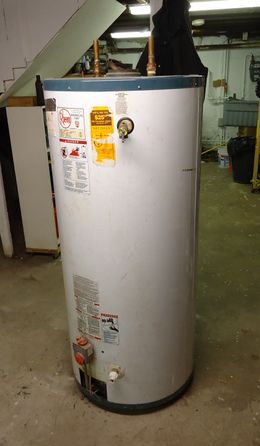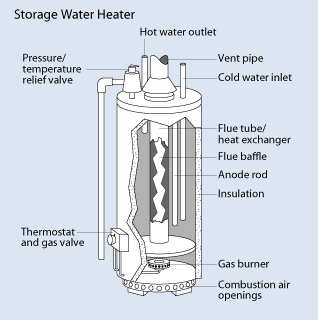Domestic water heating

Domestic water heating is the process of warming water for personal use, and it can consume a large amount of energy. In Canadian homes, water heating can consume 15-25 percent of energy used in a home depending on the house type, number of inhabitants, and the lifestyle of those who live there. It's important to note that water heating is often more than all of the electrical needs of the household, see graph below.[2] Canadians use - on average - 75 liters of hot water each day for dish washing, clothes washing, cleaning, and personal hygiene. This water volume is fairly high, and heating it can result in high energy bills.[2] Old water heaters can be replaced, recycled or re-purposed for more information please see Think Tank Home.
The energy source for water heaters tends to be the same as what people use for space heating, although this is not always true. Possible energy sources include electricity, natural gas, propane, and oil.[3] Each source has its own benefits and drawbacks. For example, electric heaters require no venting but cannot operate during a power failure and use a lot more primary energy than natural gas. Natural gas fueled heaters require adequate airflow and ventilation but heat up more quickly and use less primary energy. Propane has similar benefits to natural gas, but the fuel is more expensive and requires scheduled delivery.
Costs can be reduced by choosing a more energy efficient water heater, reducing the amount of hot water used, or installing a drain water heat recovery device to reduce the heating load. These devices are simply pipes that take the heat from the used warm water flowing down the drains and transfers it to preheat water entering the hot water tank.[4] As well, when buying a water heater it is important to consider the "second price tag", or the cost of operating the product over its lifetime. Sometimes it is more cost effective to purchase a more expensive, more energy efficient model as it will save the user money in the long run.[2]
Water Heating Methods
In general, all water heaters use some sort of fuel for energy. This energy is then used to raise the temperature of cold water from the water system before use. A wide variety of water heaters is available, and some of the more common ones are listed below. They can be used independently, but are sometimes combined into systems.[4]
Storage Tank Water Heaters

Storage tank water heaters, such as the one in Figure 2, are the most commonly used type of water heater for homes. In these systems, heated water is held in a tank so that a certain quantity of hot water is available at any time. When a tap is opened for hot water, the water flows from the tank out the tap. Unheated water then flows into the tank to replace the used water.[4] Thermostats are used on the burner to maintain the temperature of the water. These water heaters are equipped with a temperature and pressure relief valve to ensure safety.
These heaters can be inefficient, but can be made more energy efficient if standby losses are minimized or improving how much of the heat from combustion is transferred to the water by minimizing heat losses from the vents or chimneys of the heaters.[4]
Tankless Water Heaters
Tankless water heaters, as their name suggests, are heaters that heat flowing water and thus do not require a storage tank. The water is heated only when needed, this increases efficiency by eliminating standby losses. Most electric on-demand water heaters cannot supply all the water needed for a house, so they are rarely used for that application. However, several tankless gas-fired heaters can delivery enough water to supply most houses.[4] Gas-fired versions of these heaters are generally mounted on an outside wall so that flue gases can be vented more simply.
Heat Pump Water Heaters
Heat pump water heaters or HPWHs use electricity and take heat from the air and move it to the water instead of converting electricity directly to heat. Air from the room containing the heater has the heat removed from it and transferred to a tank of water. One problem with these heaters is that in addition to removing heat from the air, they also remove humidity which can become uncomfortable.[4] In the summer, however, the removal of heat from the home from these systems can be beneficial. In the winter they can increase the need for the use of a space heater.
Ground source heat pumps can be used to provide water heating in addition to space heating and cooling. They use the temperature of the Earth or groundwater as a heat source.
Solar Water Heaters
The Sun's energy can also be used to heat water in solar domestic hot water systems. Generally these are not used on their own, and instead are selected to provide about 60% of the hot water requirements of the home.[4] These systems make use of solar collectors, a circulating pump, as well as storage tanks. These are usually used to preheat water, using a conventional heater after.
Data Visualization
Domestic water heating uses a significant amount of energy, as mentioned above. To get an idea of how much energy this corresponds to when compared to other residential energy needs, a graph has been included below. Pieces of the pie chart can be moused over to see the actual values for the energy, in PJ. The data below shows how much energy is used by Canadians for different residential uses in 2012.[6] Note that in Canada, more end use energy is used in heating water than all of the residential electricity use combined!
References
- ↑ Wikimedia Commons. (August 6, 2015). Water Heater [Online]. Available: https://upload.wikimedia.org/wikipedia/commons/8/85/Handyman_project_to_disassemble_hot_water_heater_1.JPG
- ↑ 2.0 2.1 2.2 NRCAN. (August 6, 2015). Water Heaters [Online]. Available: https://www.nrcan.gc.ca/energy/products/categories/water-heaters/13735
- ↑ NRCAN. (August 6, 2015). Energy Sources - Water Heaters [Online]. Available: https://www.nrcan.gc.ca/energy/products/categories/water-heaters/14490
- ↑ 4.0 4.1 4.2 4.3 4.4 4.5 4.6 NRCAN. (August 7, 2015). Water Heater Guide [Online]. Available: http://www.nrcan.gc.ca/sites/oee.nrcan.gc.ca/files/files/pdf/equipment/WaterHeaterGuide_e.pdf
- ↑ Wikimedia Commons. (August 10, 2015). Natural Gas Storage Water Heater [Online]. Available: https://en.wikipedia.org/wiki/Storage_water_heater#/media/File:Natural_gas_storage_water_heater.gif
- ↑ NRCAN. (August 21, 2015). Residential Sector Energy Use [Online]. Available: http://oee.nrcan.gc.ca/corporate/statistics/neud/dpa/showTable.cfm?type=CP§or=res&juris=ca&rn=2&page=0

